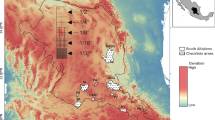Abstract
Ecologists bemoan the dearth of theory in ecology, in particular, the lack of an overarching, general theory. These complaints largely are unjustified. The components of a general theory of ecology have existed for the past half century; ecologists simply have failed to explicitly recognize them. We present a general theory of ecology and show how it relates to ecology’s numerous constituent theories and models. The general theory consists of a description of the domain of ecology and a set of fundamental principles. The domain of ecology is the spatial and temporal patterns of the distribution and abundance of organisms, including causes and consequences. Fundamental principles are broad statements about the patterns that exist and the processes that operate within a domain. The seven fundamental principles of the theory of ecology are: the heterogeneous distribution of organisms, interactions of organisms, contingency, environmental heterogeneity, finite and heterogeneous resources, the mortality of organisms, and the evolutionary cause of ecological properties. These principles are the necessary and sufficient elements for a general theory of ecology. The propositions of any constituent theory of ecology can be shown to be a consequence of these fundamental principles along with principles from other science domains. The general theory establishes relationships among constituent theories through shared fundamental principles. The next challenge is to develop and integrate unified, constituent theories and to establish the relationships among them within the framework established by the general theory.
Similar content being viewed by others
References
Begon M, Townsend CR, Harper JL (2006) Ecology, 4th edn. Blackwell, Oxford
Brown JH, Gillooly JE, Allen AP, Savage VM, West GB (2004) Toward a metabolic theory of ecology. Ecology 85:1771–1789
Chase JM, Leibold MA (2003) Ecological Niches: Linking Classical and Contemporary Approaches. University of Chicago Press, Chicago
Clements FE (1916) Plant Succession. Carnegie Institute of Washington, Washington, DC
Colinvaux P (1986) Ecology. Wiley, New York
Collins JP (1986) Evolutionary ecology and the use of natural selection in ecological theory. J Hist Biol 19:257–288
Darwin CR (1859) On the Origin of Species by Means of Natural Selection. Murray, London
Dodson SI et al. (1998) Ecology. Oxford University Press, Oxford, UK
Ehrlich PR, Roughgarden J (1987) The Science of Ecology. Macmillan, New York
Forster JR (1778) Observations made during a voyage round the world, on physical geography, natural history, and ethnic philosophy. G. Robinson, London
Giere RN (1988) Explaining Science: A Cognitive Approach. University of Chicago Press, Chicago
Gleason HA (1917) The structure and development of the plant association. Bull Torrey Bot Club 43:463–481
Gleason HA (1926) The individualistic concept of the plant association. Bull Torrey Bot Club 53:7–26
Gurevitch J, Scheiner SM, Fox GA (2006) The Ecology of Plants, 2nd edn. Sinauer, Sunderland, MA
Hanski I (1999) Metapopulation Ecology. Oxford University Press, New York
Hempel CG (1965) Aspects of Scientific Explanation. The Free, New York
Ives AR, Agrawal AA (2005) Empirically motivated ecological theory. Ecology 86:3137–3138
Krebs CJ (2001) Ecology. Benjamin Cummings, New York
Kutschera U, Niklas KJ (2004) The modern theory of biological evolution: an expanded synthesis. Naturwissenschaften 91:255–276
Lawton JH (1999) Are there general laws in ecology? Oikos 84:177–192
Leibold MA et al. (2004) The metacommunity concept: a framework for multiscale community ecology. Ecol Lett 7:601–613
Levins R (1968) Evolution in Changing Environments. Princeton University Press, Princeton, NJ
MacArthur RH, Wilson EO (1967) The Theory of Island Biogeography. Princeton University Press, Princeton, NJ
Mayr E (1982) The Growth of Biological Thought. Belknap, Cambridge, MA
McIntosh RP (1985) The Background of Ecology. Cambridge University Press, Cambridge
McNaughton SJ, Wolf LL (1973) General Ecology. Holt, Rinehart and Wilson, New York
Miller RW (1987) Fact and Method. Princeton University Press, Princeton, NJ
Mitman G (1992) The State of Nature. University of Chicago Press, Chicago
Odum EP (1971) Fundamentals of Ecology. Saunders, Philadelphia
Pickett STA, Collins SL, Armesto JJ (1987) Models, mechanisms and pathways of succession. Bot Rev 53:335–371
Pickett STA, Kolasa J, Jones CG (1994) Ecological Understanding. Academic, San Diego
Pimm SL (1982) Food Webs. Chapman and Hall, New York
Ricklefs RE (1979) Ecology. Chiron, New York
Scheiner SM, Rey-Benayas JM (1994) Global patterns of plant diversity. Evol Ecol 8:331–347
Scheiner SM, Willig MR (2005) Developing unified theories in ecology as exemplified with diversity gradients. Am Nat 166:458–469
Simberloff D (2004) Community ecology: is it time to move on? Am Nat 163:787–799
Stephens DW, Krebs JR (1986) Foraging Theory. Princeton University Press, Princeton, NJ
Stiling P (1992) Ecology. Prentice Hall, Upper Saddle River, NJ
Suppe F (1977) The Structure of Scientific Theories. University of Illinois Press, Urbana, IL
Turchin P (2001) Does population ecology have general laws? Oikos 94:17–26
von Humboldt A (1808) Ansichten der Natur mit wissenschaftlichen Erlauterungen. J. G. Cotta, Tübingen, Germany
Whewell W (1858) Novum Organon Renovatum, London
Willig MR, Kaufman DM, Stevens RD (2003) Latitudinal gradients of biodiversity: pattern, process, scale, and synthesis. Annu Rev Ecol, Evol, and Syst 34:273–309
Acknowledgements
For insightful comments, we thank Jim Collins, Gordon Fox, Jim Grace, Bob Holt, Jane Maienschein, Alan Tessier, Bill Zamer, and several anonymous reviewers. This manuscript is based on work done by both authors while serving at the National Science Foundation. The views expressed in this paper do not necessarily reflect those of the National Science Foundation or the United States Government. Partial support to MRW was provided by the Center for Environmental Sciences and Engineering at the University of Connecticut.
Author information
Authors and Affiliations
Corresponding author
Rights and permissions
About this article
Cite this article
Scheiner, S.M., Willig, M.R. A general theory of ecology. Theor Ecol 1, 21–28 (2008). https://doi.org/10.1007/s12080-007-0002-0
Received:
Accepted:
Published:
Issue Date:
DOI: https://doi.org/10.1007/s12080-007-0002-0




